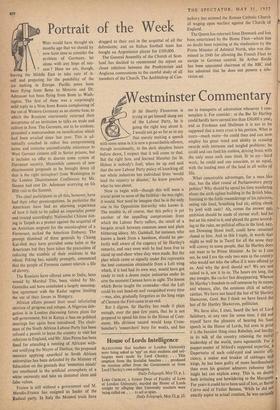Portrait of the Week
WHO would have thought six months ago that we should by now have time to consider the problem of Germany, let alone with any hope of suc- cess ? Here we are, though, leaving the Middle East to take care of it- self and preparing for the possibility of the ice melting in Europe. Pacific notes have been flying from Bonn to Moscow and Dr. Adenauer has been flying from Bonn to Wash- ington. The first of these was a surprisingly mild reply to a Note from Russia complaining of the use of Western Germany as an atomic base, to which the Russians courteously returned their acceptance of an invitation to talks on trade and culture in June. The Germans, not to be outdone, presented a memorandum on reunification which had been awaited since last year. This is ad- mittedly couched in rather less compromising terms and contains uncomfortable references to West German citizens still in Soviet prisons, but it includes an offer to discuss some system of European security. Meanwhile rumours of new . disarmament proposals to be brought down (if that is the right metaphor) from Washington to the London Disarmament Conference by Mr. .Stassen had sent Dr. Adenauer scurrying on his fifth visit to the Summit.
The chief participants in all this, however, have had their other preoccupations. In particular the Americans have had an alarming experience of how it feels to be called an imperialist power and treated accordingly; Nationalist Chinese riot- ing in Taipeh as a protest against the acquittal of an American sergeant for the manslaughter of a Formosan, sacked the American Embassy. The prompt dismissal of three generals by Chiang Kai-shek may have provided some balm to the Americans but they have taken the precaution of reducing the number of their residents in the island. Peking has, equally promptly, announced that the people of Formosa cannot tolerate a life of slavery.
The Russians have offered arms to India, been wooed by Marshal Tito, been visited by Mr. Gomulka and have concluded a largely meaning- less agreement with the Kadar regime limiting the use of their forces in Hungary.
African affairs present their usual infuriating mixture of progress and relapse. A Nigerian dele- gation is in London discussing future plans for self-government, but in Kenya a ban on political meetings has again been introduced. The chair- man of the South African Labour Party has been refused a permit to leave the country to visit her relations in England, and Mr. Alan Paton has been fined for attending a meeting of Africans with- out notifying the Mayor of Durban; the proposed measure applying apartheid to South African universities has been defended by the Minister of Education on the grounds that 'immature minds' are smothered in the artificial atmosphere, of a white university and take on distorted ideas and false values.
France is still without a government and M. Mendes-France has resigned as leader of the Radical party. In Italy the Montesi trials have dragged to their end in the acquittal of all the defendants; and an Italian football team has bought an Argentinian player for £100,000.
The General Assembly of the Church of Scot- land has decided to recommend the report on closer relations between the Presbyterian and Anglican communions to the careful study of all members of the Church. The Archbishop of Can- terbury has accused the Roman Catholic Church of waging open warfare against the Church of England.
The Queen has returned from Denmark and has been entertained by the Home Fleet—which has no doubt been rejoicing at the vindication by the Prime Minister of Admiral North, who was dis- missed in 1940 for allowing the French Fleet to escape to German control. Sir Arthur fforde has been appointed chairman of the BBC and has admitted that he does not possess a tele- vision set.










































 Previous page
Previous page